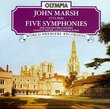| All Artists: Myaskovsky, Tarasova Title: Cello Concerto Members Wishing: 0 Total Copies: 0 Label: Olympia Release Date: 11/29/1994 Genre: Classical Styles: Chamber Music, Forms & Genres, Concertos, Historical Periods, Classical (c.1770-1830), Instruments, Strings Number of Discs: 1 SwapaCD Credits: 1 UPCs: 515524005306, 723721970727, 501552440530 |
Search - Myaskovsky, Tarasova :: Cello Concerto
 | Myaskovsky, Tarasova Cello Concerto Genre: Classical
|
CD DetailsSimilar CDs
|
CD ReviewsGracefullness & melancholy: among Myaskovsky's hallmarks. David A. Hollingsworth | Washington, DC USA | 06/01/2002 (4 out of 5 stars) "Myaskovsky's cello sonatas (of 1911/rev. 1931 & of 1948 respectively) are rewarding pieces in their own right and it's quite easy to see why a good number of Russian and Non-Russian artists (like Rostropovich, to whom Myaskovsky dedicated the Second) championed them throughout much of their careers. The Sonatas are of considerable depth and substance, permeating with a huge sense of warmth and melancholy that's capable of moving those from within. And while they're not the most original and virtuousic of compositions of this genre, particularly for solo cello (Rachmaninov was in the composer's mind in the First Sonata while Tchaikovsky's lyricism is noticable in the Second), they're as idiomatic and personal as expected. The melodious Second Sonata is especially autumnal in mood, like leaves falling gracefully to the ground in a peaceful day of October. The radiant, soul searching Cello Concerto of 1944 is often compared with Elgar's in sensitivity and the emphasis upon the cello on the songlike, cantibile qualities embitted (although Vainberg's Concerto and Kabalevsky's Second Concerto come to mind). Dedicated to the cellist Sviatoslav Knushevitzky, the score is melancholic and inward-looking, alongside the radiance that peeks through especially at the first half of the second movement. It is quite a masterpiece and largely relates to the contemporaneous Twenty-fifth Symphony in feeling of warmth and in places contemplation (though the Symphony has that inpirational ending to it).The renditions of both cellist Marina Tarasova and pianist Alexander Polezhaev are done with upmost sympathy and admiration of the works. And while some indulgence is understandably at presence, the soloists give the works a greater sense of memorability. But, in terms of suave and flow, Julian Lloyd Webber (in the Philips label), to my mind, outshine Tarasova in the Concerto. Furthermore, as far as conducting is concerned, I'm more at rapport with Maxim Shostakovich's flair and approach to the score more so than with Samoilov's (and the London Symphony responds with more grace and attack than the Moscow New Opera Orchestra). The recording, not as superior as Philips, gives the works a good enough justice. So, despite a few reservations, this CD is ultimately indispensable."
|

 Track Listings (6) - Disc #1
Track Listings (6) - Disc #1

